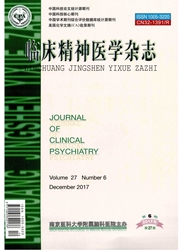

 中文摘要:
中文摘要:
目的:研究齐拉西酮对慢性不可预见应激(chronic unpredictable stress,cus)大鼠抑郁样行为的改善作用以及对海马神经发生的作用。方法:将24只大鼠分为对照组(n=8),慢性不可预见应激组(n=8)和齐拉西酮组(Ft=8),建立CUS大鼠模型,连续7d给予齐拉西酮[2.5mg/(kg·d)],通过旷场及糖水摄取实验观察各组动物行为学变化、溴脱氧尿嘧啶核苷(BrdU)掺入实验观察海马增殖情况,蛋白质印迹法(Westernblot)检测海马B细胞淋巴瘤/白血病-2(Bcl-2)、脑源性神经营养因子(BD.NF)和磷酸化细胞外信号调节激酶(pERK1/2)的表达水平的变化。结果:持续21d的慢性不可预见应激抑制了动物对糖水的偏好及单位时间内运动距离(与对照组相比较,P均〈0.05),而给予齐拉西酮可以改善这种现象(与慢性不可预见应激组比较,P均〈0.05);BrdU染色结果显示,齐拉西酮可以显著增加海马的增殖细胞数,而且增加了增殖细胞中的神经元比率(与慢性不可预见应激组比较,P均〈0.05);进一步通过Westernblot发现,CUS应激抑制了大鼠海马Bcl-2、BDNF及pERK1/2的表达(与对照组相比较,P均〈0.05),而给予齐拉西酮则缓解了这一下降现象(与慢性不可预见应激组比较,P均〈0.05)。结论:齐拉西酮能够改善动物模型的抑郁行为,而这一作用可能与其促进海马Bcl-2、BDNF及pERK1/2的表达,进而促进海马神经发生来实现的。
 英文摘要:
英文摘要:
Objective:To investigate the effect of ziprasidone on the improvement of ethology and neuro- genesis in chronic unpredictable stress (CUS) rats. Method:24 healthy rats were divided into 3 groups at ramdom : Non-CUS + saline ( n = 8 ), CUS + saline ( n = 8 ), CUS + ziprasidone ( n = 8 ), after the establishment of CUS model, rats were received ziprasidone (2.5 mg/kg/day) for 7 days intragastrically. Immediately after CUS or after drug administration ,rats were subjected to sucrose preference testing and open field test. To assess the proliferation of cells, Bromodeoxyuridine (BrdU) was administered before the last behavioral test and ana- lyzed 14 days later, and the expression of B-cell lymphoma 2 (Bcl-2), brain derived neurophic factor (BDNF) and phosphated extracellular signal-regulated kinase (pERK1/2) in hippocampus were determined by Western blot at the end of the last behavioral test. Results:Ziprasidone blocked the reduction of sucrose preference and the total traveling distance ( compared with the CUS + saline group, all P 〈 0.05) which was caused by chronic unpredictable stress ( compared with the Non-CUS + saline group, all P 〈 0.05 ) ; There was a significant increase in the number of hippocampal BrdU + ceils in CUS + ziprasidone than CUS rats ( all P 〈 0.05 ), and the number of cells co-labeled with NeuN, a marker of neurons, and BrdU in the hippocampal dentate gyms (DG) was also significantly higher in the CUS + ziprasidone rats than CUS + saline rats; Furthermore, exposure to CUS resulted in a significant decrease in the expression of pERK1/2, Bcl-2 and BDNF of hippocampus ( all P 〈 0. 05) , and ziprasidone-infused rats ( CUS + ziprasidone) showed significantly increase of the expression of pERK1/2,Bcl-2 and BDNF (compared with the CUS + saline group,all P 〈0. 05). Conclusion:These data suggest that the neurogenesis effect of ziprasidone may play an important role in depression therapy, and this
 同期刊论文项目
同期刊论文项目
 同项目期刊论文
同项目期刊论文
 The effect of citalopram on chronic stress-induced depressive-like behavior in rats through GSK3 bet
The effect of citalopram on chronic stress-induced depressive-like behavior in rats through GSK3 bet Quetiapine add-on therapy improves the depressive behaviors and hippocampal neurogenesis in fluoxeti
Quetiapine add-on therapy improves the depressive behaviors and hippocampal neurogenesis in fluoxeti Gastrodin Ameliorates Anxiety-Like Behaviors and Inhibits IL-1β Level and p38 MAPK Phosphorylation o
Gastrodin Ameliorates Anxiety-Like Behaviors and Inhibits IL-1β Level and p38 MAPK Phosphorylation o Antipsychotics promote the differentiation of oligodendrocyte progenitor cells by regulating oligode
Antipsychotics promote the differentiation of oligodendrocyte progenitor cells by regulating oligode Citalopram alleviates chronic stress induced depression-like behaviors in rats by activating GSK3 be
Citalopram alleviates chronic stress induced depression-like behaviors in rats by activating GSK3 be Electroconvulsive therapy improves antipsychotic and somnographic responses in adolescents with firs
Electroconvulsive therapy improves antipsychotic and somnographic responses in adolescents with firs Sensorimotor gating and memory deficits in an APP/PS1 double transgenic mouse model of Alzheimer&apo
Sensorimotor gating and memory deficits in an APP/PS1 double transgenic mouse model of Alzheimer&apo Anti-depressive mechanism of repetitive transcranial magnetic stimulation in rat: The role of the en
Anti-depressive mechanism of repetitive transcranial magnetic stimulation in rat: The role of the en Quetiapine and repetitive transcranial magnetic stimulation ameliorate depression-like behaviors and
Quetiapine and repetitive transcranial magnetic stimulation ameliorate depression-like behaviors and Gastrodin Alleviates Cerebral Ischemic Damage in Mice by Improving Anti-oxidant and Anti-inflammatio
Gastrodin Alleviates Cerebral Ischemic Damage in Mice by Improving Anti-oxidant and Anti-inflammatio Rosmarinic acid ameliorates PTSD-like symptoms in a rat model and promotes cell proliferation in the
Rosmarinic acid ameliorates PTSD-like symptoms in a rat model and promotes cell proliferation in the Atypical Antipsychotics Do Not Reverse Prepulse Inhibition Deficits in Acutely Psychotic Schizophren
Atypical Antipsychotics Do Not Reverse Prepulse Inhibition Deficits in Acutely Psychotic Schizophren 期刊信息
期刊信息
